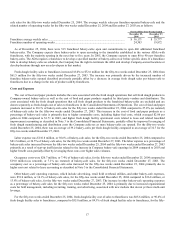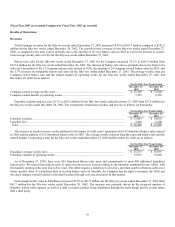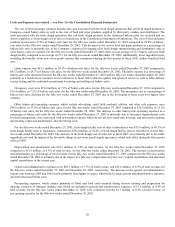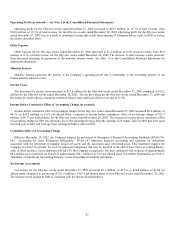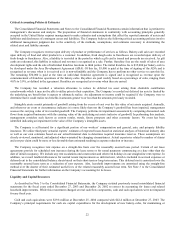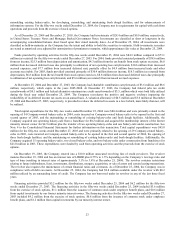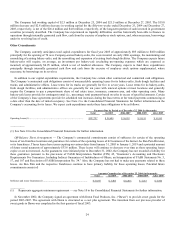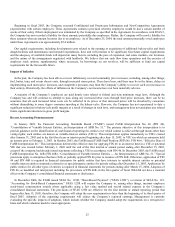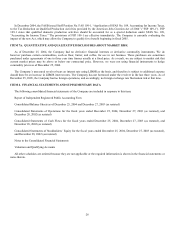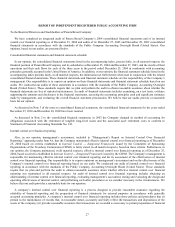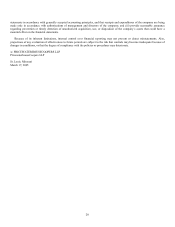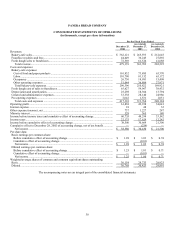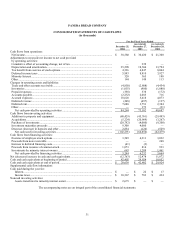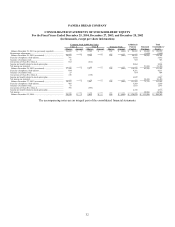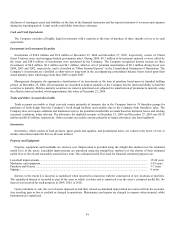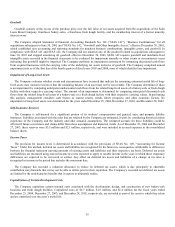Panera Bread 2004 Annual Report Download - page 31
Download and view the complete annual report
Please find page 31 of the 2004 Panera Bread annual report below. You can navigate through the pages in the report by either clicking on the pages listed below, or by using the keyword search tool below to find specific information within the annual report.Beginning in fiscal 2003, the Company executed Confidential and Proprietary Information and Non-Competition Agreements
(Agreements) with certain employees. These Agreements contain a provision whereby employees would be due a certain number of
weeks of their salary if their employment was terminated by the Company as specified in the Agreement. In accordance with SFAS 5,
the Company has not recorded a liability for these amounts potentially due employees. Rather, the Company will record a liability for
these amounts when an amount becomes due to an employee. As of December 25, 2004, the total amount potentially owed employees
under these Agreements was approximately $5.4 million.
Our capital requirements, including development costs related to the opening or acquisition of additional bakery-cafes and fresh
dough facilities and maintenance and remodel expenditures, have and will continue to be significant. Our future capital requirements
and the adequacy of available funds will depend on many factors, including the pace of expansion, real estate markets, site locations,
and the nature of the arrangements negotiated with landlords. We believe that our cash flow from operations and the exercise of
employee stock options, supplemented, where necessary, by borrowings on our revolver, will be sufficient to fund our capital
requirements for the foreseeable future.
Impact of Inflation
In the past, the Company has been able to recover inflationary cost and commodity price increases, including, among other things,
fuel, butter, tuna, and cream cheese costs, through increased menu prices. There have been, and there may be in the future, delays in
implementing such menu price increases, and competitive pressures may limit the Company’s ability to recover such cost increases in
their entirety. Historically, the effects of inflation on the Company’s net income have not been materially adverse.
A majority of the Company’s employees are paid hourly rates related to federal and state minimum wage laws. Although the
Company has and will continue to attempt to pass along any increased labor costs through food price increases, there can be no
assurance that all such increased labor costs can be reflected in its prices or that increased prices will be absorbed by consumers
without diminishing to some degree consumer spending at the bakery-cafes. However, the Company has not experienced to date a
significant reduction in bakery-cafe profit margins as a result of changes in such laws, and management does not anticipate any related
future significant reductions in gross profit margins.
Recent Accounting Pronouncement
In January 2003, the Financial Accounting Standards Board (“FASB”) issued FASB Interpretation No. 46 (FIN 46),
“Consolidation of Variable Interest Entities, an Interpretation of ARB No. 51.” The primary objective of this interpretation is to
provide guidance on the identification of, and financial reporting for, entities over which control is achieved through means other than
voting rights; such entities are known as variable-interest entities (VIE’s). This interpretation applies immediately to VIE’s created
after January 31, 2003 and in the first fiscal year or interim period beginning after June 15, 2003, to VIE’s in which an enterprise held
an interest prior to February 1, 2003. In October 2003, the FASB issued FASB Staff Position (FSP) No. FIN 46-6, “Effective Date of
FASB Interpretation 46.” This interpretation deferred the effective date for applying FIN 46 to an interest held in a VIE or potential
VIE that was created before February 1, 2003 until the end of the first interim or annual period ending after December 15, 2003,
except if the company had already issued statements reflecting a VIE in accordance with FIN 46. In December 2003, the FASB issued
FASB Interpretation No. 46R (FIN 46R), “Consolidation of Variable Interest Entities — An Interpretation of ARB No. 51.” Special
provisions apply to enterprises that have fully or partially applied FIN 46 prior to issuance of FIN 46R. Otherwise, application of FIN
46 and FIN 46R is required in financial statements for public entities that have interests in variable interest entities or potential
variable interest entities commonly referred to as special-purpose entities for periods ending after December 15, 2003. Application by
public entities for all other types of entities is required in financial statements for periods ending after March 15, 2004. Adoption of
FIN 46, as modified and interpreted, including the provisions of FIN 46R, in the first quarter of fiscal 2004 did not have a material
effect on the Company’s consolidated financial statements or disclosures.
In December 2004, the FASB issued SFAS No. 123R, “Share-Based Payment” (“SFAS 123R”), a revision of SFAS No. 123,
“Accounting for Stock-Based Compensation.” SFAS 123R will require the Company to, among other things, measure employee
stock-based compensation awards where applicable using a fair value method and record related expense in the Company’s
consolidated financial statements. The provisions of SFAS 123R are effective for the first interim or annual reporting period that
begins after June 15, 2005; therefore, the Company will adopt the new requirements no later than the beginning of its third quarter of
fiscal 2005. Adoption of the expensing requirements will reduce the Company’s reported earnings. Management is currently
evaluating the specific impacts of adoption, which include whether the Company should adopt the requirements on a retrospective
basis and which valuation model is most appropriate.
25




